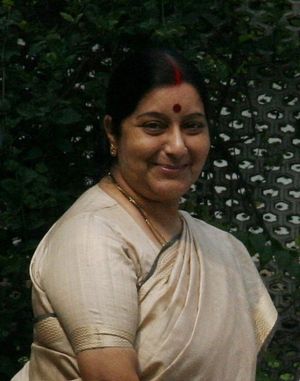Indian External Affairs Minister Sushma Swaraj is in Kabul on Wednesday as Afghanistan grapples with a prolonged electoral crisis that began in June. Most recently, one of the two Afghan presidential candidates involved in the run-off vote that took place on June 14, Abdullah Abdullah, declared at the last minute that he would not abide by an earlier agreement, brokered by the United States, that saw all 8 million votes cast in the run-off audited for fraud. Instead, Abdullah prematurely and unilaterally declared victory in the election — potentially polarizing his support base against that of his opponent, Ashraf Ghani. Swaraj’s trip to Kabul comes at a crucial hour and could result in important dividends for New Delhi once the current crisis is resolved.
Beyond Afghan President Hamid Karzai’s attendance at Indian Prime Minister Narendra Modi’s inauguration in May, the governments of India and Afghanistan have not interacted at a high-level since the Bharatiya Janata Party (BJP) took over in New Delhi. While Swaraj is slated to meet with the outgoing Karzai government, discussing routine matters such as development assistance, Afghan reconstruction, and security cooperation, she will also convey New Delhi’s desire to see the current electoral crisis resolved via negotiation and according to the terms of the U.S.-brokered, U.N.-enforced deal.
India bears the benefit of being perceived positively almost unanimously among mainstream Afghan politicians (this, of course, doesn’t include the Taliban and other extremist groups). Both presidential candidates have a positive understanding of India’s relations with Afghanistan (as does the outgoing government). With her trip to Kabul, Swaraj makes India visible at a crucial juncture in Afghanistan’s political transition. Given her trip’s agenda, it appears unlikely that she will attempt to broker a return to the prior agreement between Ghani and Abdullah (though she will meet with them). Afghan President Hamid Karzai has called for the two candidates to put aside their differences in the interest of the country. Swaraj would do well to communicate her agreement with that sentiment, at least to the Afghan press. While India can’t be a panacea for Afghanistan’s electoral troubles, it needs to ensure that it stands on the best possible footing to immediately engage Afghanistan’s next president.
By backing a return to the established agreement’s procedures, Swaraj would join a growing chorus of global voices including U.N. Secretary-General Ban Ki-moon, U.S. Secretary of State John Kerry, and others that have called for composure and negotiation during this crisis. Abdullah’s declaration could have the disastrous effect of polarizing supporters to the extent that the fragile ethnic balance of this election collapses and inter-ethic violence breaks out along political lines. This outcome, naturally, would be a nightmare for India, which wants to see a prosperous and stable Afghanistan.
Although India likely won’t be too activist on the matter of resolving Afghanistan’s political dispute, if it chose to, it might have a unique appeal with both candidate’s supporters. Many Afghans, particularly Abdullah’s supporters, bemoan extensive U.S. involvement in defusing the electoral crisis. In particular, should Abdullah be found to have lost the election (all signs point to this outcome), his supporters will see repeats of the 2009 election, when Abdullah agreed to cede victory to Karzai instead of holding out for a fair and comprehensive recount and audit. India can’t change the results of the audit, but it can encourage the candidates to stick to the unity government deal under which the losing candidate would gain some political authority under a newly manufactured chief executive post within the Afghan government. New Delhi’s status as a regional friend and a decidedly non-Western power could give it some staying power with the candidates.

































